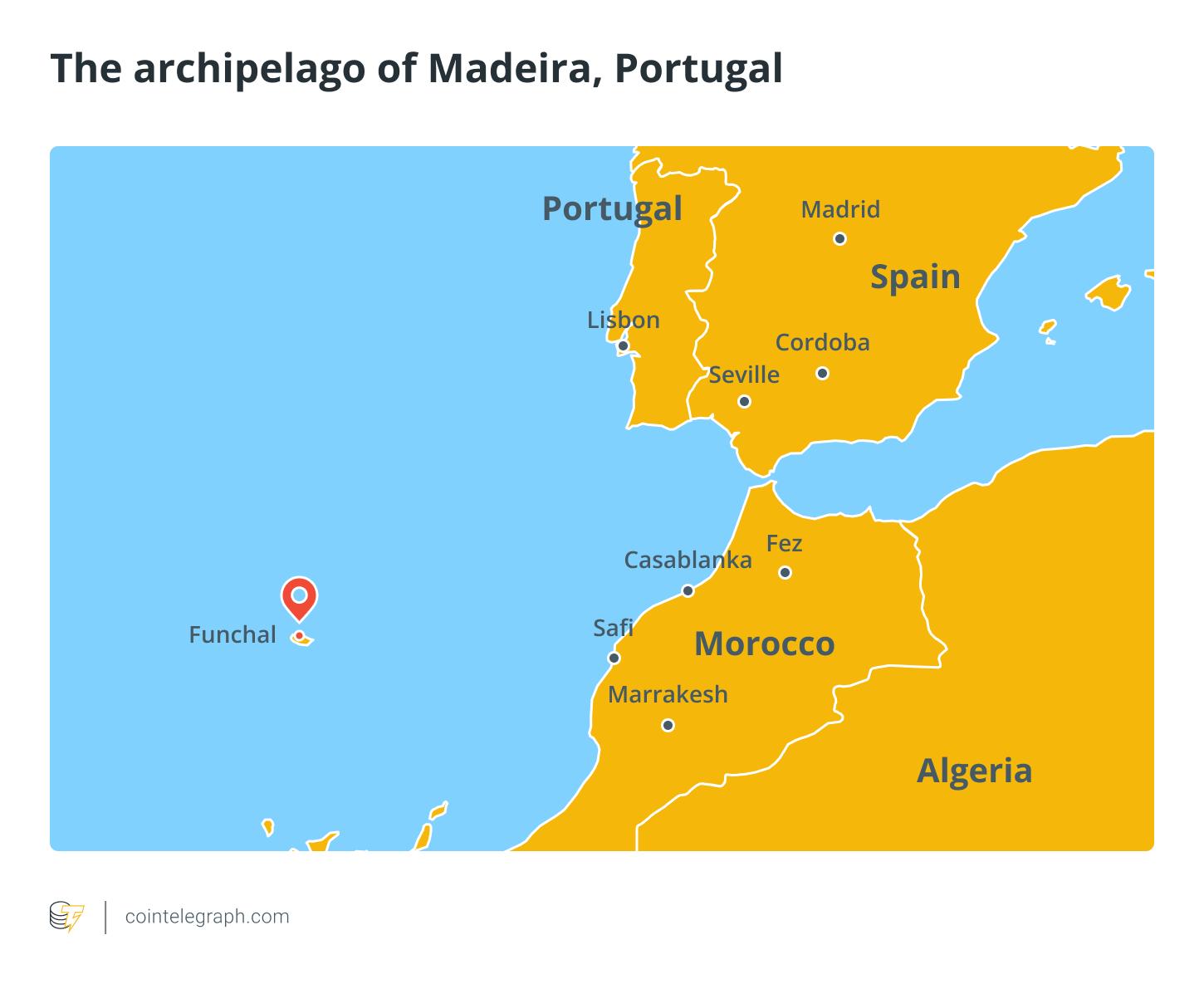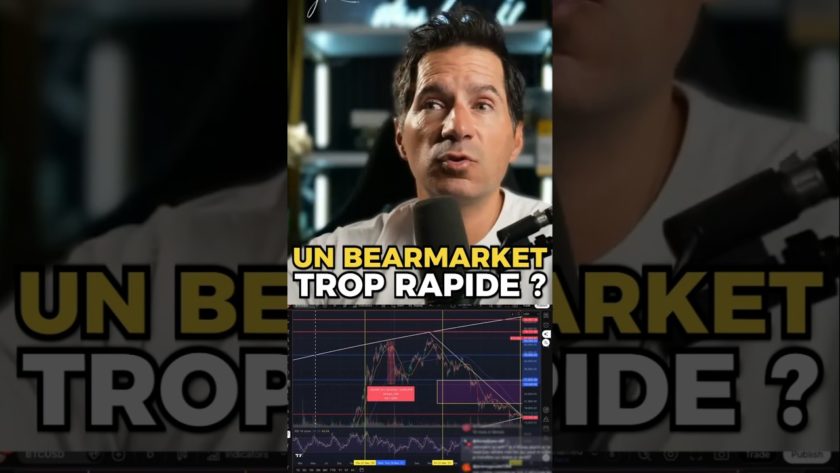This spring, the Madeiran archipelago “adopted” Bitcoin (BTC). Madeira’s President, Miguel Albuquerque, was invited onto the stage at Bitcoin Miami 2022 by Jan3 CEO Samson Mow to announce the promise.
The president announced, “I believe in the future, and I believe in Bitcoin.” Days prior, Albuquerque was breaking bread with Michael Saylor, executive chairman of MicroStrategy, at his luxury villa. Albuquerque was “orange-pilled” by one of the world’s wealthiest Bitcoin hodlers.
Nonetheless, as Cointelegraph later reported, the island of Madeira was not adopting but, in fact, “embracing” Bitcoin. The European Union governs the Portuguese islands, therefore, they cannot legally adopt Bitcoin as a legal tender. Plus, regulatory hurdles and reliance on EU subsidies and energy pose a challenge to outright Bitcoin adoption.
So Cointelegraph caught up with André Loja, the Madeiran entrepreneur and driving force behind the island’s Bitcoin strategy, following his appearance on stage at Bitcoin Amsterdam 2022.
Taking advice from F.R.E.E Madeira
Over the past six months, Loja has founded The Regional Forum of Economic Education, or F.R.E.E Madeira, alongside Bitcoin big-hitters including Bitcoin author Knut Svanholm and podcaster Daniel Prince. The board’s advisers boast entrepreneur and author Jeff Booth, Fedmint CEO Obi Nwosu, as well as Mow. The group serves to ensure the president upholds his “serious commitment,” Jeff Booth explained, to making Madeira a home for the “new base layer of the new internet.”
The island now boasts a series of Bitcoin-first investments, developments and even Bitcoiner residents, as well as a steady trickle of crypto-curious people who have embarked on their first trip to the island.
Loja told Cointelegraph that while Bitcoin is at the core of economic development and investment, “Madeira is not only investing in Bitcoin, but all kinds of technologies.” For example, a center for ocean-oriented startups and an advanced medical center are under construction.

These economic activities fit under the president’s purview of adopting new technologies and working toward Madeira, shedding its reputation as uniquely a haven for older generations. Nonetheless, these developments in wider technology dwindle in comparison to the progress made in embracing the world’s largest cryptocurrency.
Following a series of talks with Bitcoin OGs, including privacy advocate Matt Odell and Unchained Capital’s Parker Lewis, Madeira has the green light to set up a Bitcoin Commons. “It’s basically a big Bitcoin-only coworking space. It’ll also be a place to park the association,” Loja explained. The Bitcoin Commons is a space for the nonprofit, F.R.E.E. Madeira, to thrive:
“We’ll have a podcast room there, we’ll do the [Bitcoin] meetups, we’ll do the education part there. We’ll also have the remittances also set up there with the ATM and so on to connect to the diaspora.”
The Madeiran diaspora sprawls across the globe. Lucinda Castro, a Madeiran lawyer on the governance board of F.R.E.E., told Cointelegraph in June that “Madeirans emigrated to Venezuela, the United States and Canada in their thousands;” inclusive of second and third-generation immigrants, there are now over one million Madeirans living in Venezuela. The use case of Bitcoin as a remittance tool for Madeirans is, therefore, compelling.
Sending money home from overseas played a part in El Salvador’s move to adopt Bitcoin as legal tender, while another small island nation, Tonga, has also been vocal in supporting Bitcoin remittance payments.
The Bitcoin Commons will also support human development with the founding of a coding academy. The academy encourages Bitcoin companies around the world to travel to Madeira to learn new skills while providing locals with a space to hone their digital skills on the island. The Bitcoin Academy, as it will become known, also shines a light on the Lightning Network, the layer-2 payments network.
Will Bitcoin be the standard in Madeira?
As things stand, Bitcoin believers can purchase property, invest and mingle with the budding Bitcoin community on the island, Loja explained. On stage at Bitcoin Amsterdam 2022, Jeff Booth announced his intent to invest in the island, adding, “an island such as Madeira can compete globally and can be the new Silicon Valley.”
However, in order to facilitate payment in Bitcoin, investors should enlist the help of a third-party intermediary, such as Archipelago Investments. Bitcoin merchant adoption is slowly spreading across the island, but much like the mainland, it’s a challenge to live on a Bitcoin standard. Across the Atlantic in Lisbon, there’s a thriving Bitcoin community, but very few merchants accept Bitcoin as a means of exchange.
The panel in Amsterdam was frank in response to questions regarding merchant Bitcoin acceptance. The team at F.R.E.E. is set on guiding the president and the administration into the new Bitcoin era. Ultimately, the autonomous region must roll out Bitcoin adoption without burning bridges with the EU on which Madeira remains heavily dependent. Merchant adoption will come, however, and “that’s what the [Bitcoin] plebs are for,” Svanholm said.
Related: Portugal proposes 28% tax on annual crypto trading profits next year
Just like mainland Portugal, Madeira’s first language is Portuguese, and Portuguese business resources are growing. Nico Laamanen, a co-founder of the Konsensus Network, established business operations on the island as part of his mission to “make Bitcoin knowledge accessible to everyone, in every country, in every language.” Naturally one of their priorities is translating books into Portuguese:
“Madeira is great for remote workers which overlaps with many bitcoiners myself included. The tax regime, friendly environment and Bitcoin curiosity are just big bonuses.”
The Looking Glass Education, backed by F.R.E.E. adviser Greg Foss, is another sound money educational resource to support Madeira.
When pressed on whether Madeira is effectively becoming a European hub for Bitcoin development, Loja joked, “that’s the idea.” Notwithstanding headwinds posed by Portugal jockeying to tax crypto gains, the Madeira initiative should put the island firmly on the map for Bitcoin adoption.
Finally, Bitcoin filmmakers PlebMusic and Cinemuck shot F.R.E.E.’s initial meetings with policymakers and politicians on the island and showed the trailer at Bitcoin Amsterdam 2022. The full documentary will screen by December 2022 and will likely equip the island with another Bitcoin-friendly marketing tool.
Laamanen concluded, “I think Madeira will become a hotspot for bitcoin entrepreneurs and users in Europe and I want to be a part if it.”



